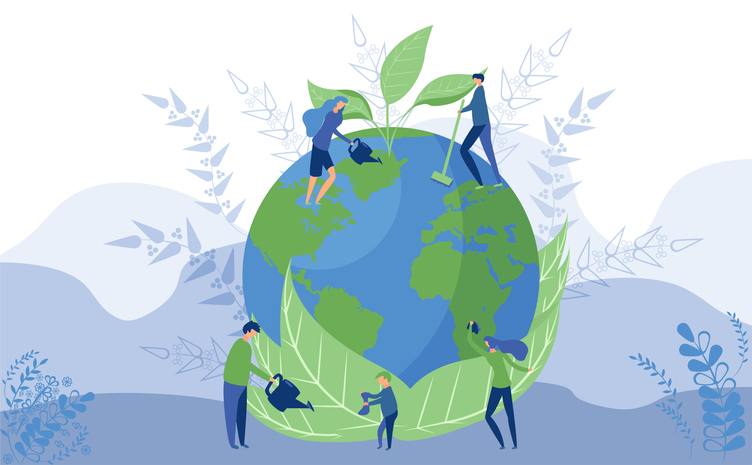
©Andrii Kolomiiets/iStock/Getty Images Plus
In the past few months, the effects of the COVID-19 pandemic have been swift and profound. Billions of people have complied with stay-at-home orders, and governments worldwide have injected trillions of dollars into their economies to support both struggling businesses and infinite individuals who have found themselves unemployed.
While conversations about complying with Environmental, Social and Governance (ESG) criteria certainly occurred before the pandemic, the scale and severity of the global health crisis have further highlighted the fact that economic activity can no longer be limited to merely the pursuit of financial profit. Going forward, it is to be hoped that no one will want to go back to how things were pre-COVID-19, neither companies, states, consumers nor investors.
In recent months, various companies have shifted to produce ventilators, face coverings, and cleaning supplies, as they consider their contributions to the greater good of society. The “S” in ESG stands out now, more than ever. Company expectations continue to evolve with a greater emphasis on social commitment and the place they wish to occupy to serve society’s general interests. It is no longer a question of being limited to the simple creation of value, but of looking at the way in which this value is created. This rapid development can be explained both by public awareness and the new requirements of customers, investors and authorities.
This unprecedented crisis is prompting companies to act with integrity and purpose, and brings to light the French expression, raison d'être, translated as reason for being, as the guiding framework and top priority for action. In this context, what could be the emerging trends or the lasting impacts of COVID-19 on the way ESG topics are valued? Could ESG initiatives be accelerated? How are businesses going to transform themselves to ensure their future sustainability?
Contributing to the greater good
Organizations have quickly pivoted since the onset of this crisis to help find solutions. A few concrete examples that come to mind are Google’s $800 million donation to the World Health Organization, LVMH’s revamped production line focused on hand sanitizer, and Toyota’s shift to manufacture protective visors for healthcare workers.
Companies that demonstrate their civic engagement, especially during this once-in-a-century crisis, prove that they are ready to assume a responsible role within the global community, at the service of their customers and more broadly for a collective well-being.
States also have a role to play, and cannot be overlooked in the advancement of ESG criteria. They are already working to meet their national climate commitments for 2030, with the goal of achieving zero net emissions by 2050. One of the most visible consequences of the pandemic has been the decline in energy demand and plummeting of oil prices around the world. However, when factory activity fully resumes, transportation reopens, and economies begin to recover, carbon dioxide emissions are likely to increase to previous levels and even beyond, jeopardizing the transition to a low carbon economy. Faced with this risk, developing government stimulus plans should include an ESG component, or if interpreted otherwise, a strong ESG commitment.
Collaboration is key
Collaboration between public authorities and the private sector on ESG issues is more crucial than ever. The Net-Zero Asset Owner Alliance, for example, brings investors together to protect both people and the planet with the knowledge that companies that transform their businesses to deliver a low carbon economy will benefit most from the opportunities presented by climate change. The coalition represents more than 16 asset managers, with nearly $4 trillion in investments worldwide and aims to move their portfolios toward zero net emission investments by 2050.
It is increasingly evident that economic strength and ESG cannot, and should not, be separated. Certain companies, and potentially entire sectors and regions of the world, will become less and less attractive to investors due to ESG risks, which will make their financing much more expensive. At Euler Hermes, we began integrating ESG criteria into our country risk ratings back in January. It’s an essential part of the mix for investment decisions.
Overall, the COVID-19 crisis has demonstrated the close tie between sustainability, corporate resilience and economic activity. As companies conduct scenario planning and think through their strategy for the next crisis, ESG factors are likely to become the new standard for helping businesses respond effectively to unexpected challenges. Future epidemics and natural disasters are associated with increased risk to supply chains and increased vulnerability of countries and businesses.
The path forward
It is time for all of us to start questioning our actions at both the personal and professional level. Are we, as consumers and businesses, able to return to our previous lifestyles without questioning the impact of each operation, purchase or investment? Will we continue to support companies that are not looking for alternative solutions to reduce their impact on the environment and promote the greater good of society? Will we be willing to support companies who mistreated their customers or employees while at their most vulnerable during this period?
The COVID-19 crisis will mark a turning point in our history as businesses, governments and consumers become more vigilant on ESG issues and their global consequences. Organizations that did not prioritize ESG issues will now understand the need to ensure that they have solid contingency plans, as well as effective protections for their people and key stakeholders.
At the end of the day, the coronavirus pandemic is first and foremost, a human tragedy, but also one that illustrates great economic hardship. It could also be a major catalyst for humanity if sustainable practices at both company and government levels are quickly implemented. When it comes to our journey towards a society that places more emphasis on raison d'être, we can be confident in the future.
Virginie Fauvel is Euler Hermes Chief Transformation Officer and Board Member for the Americas.